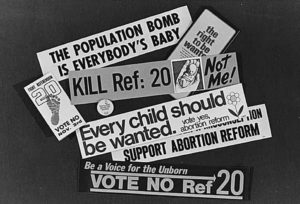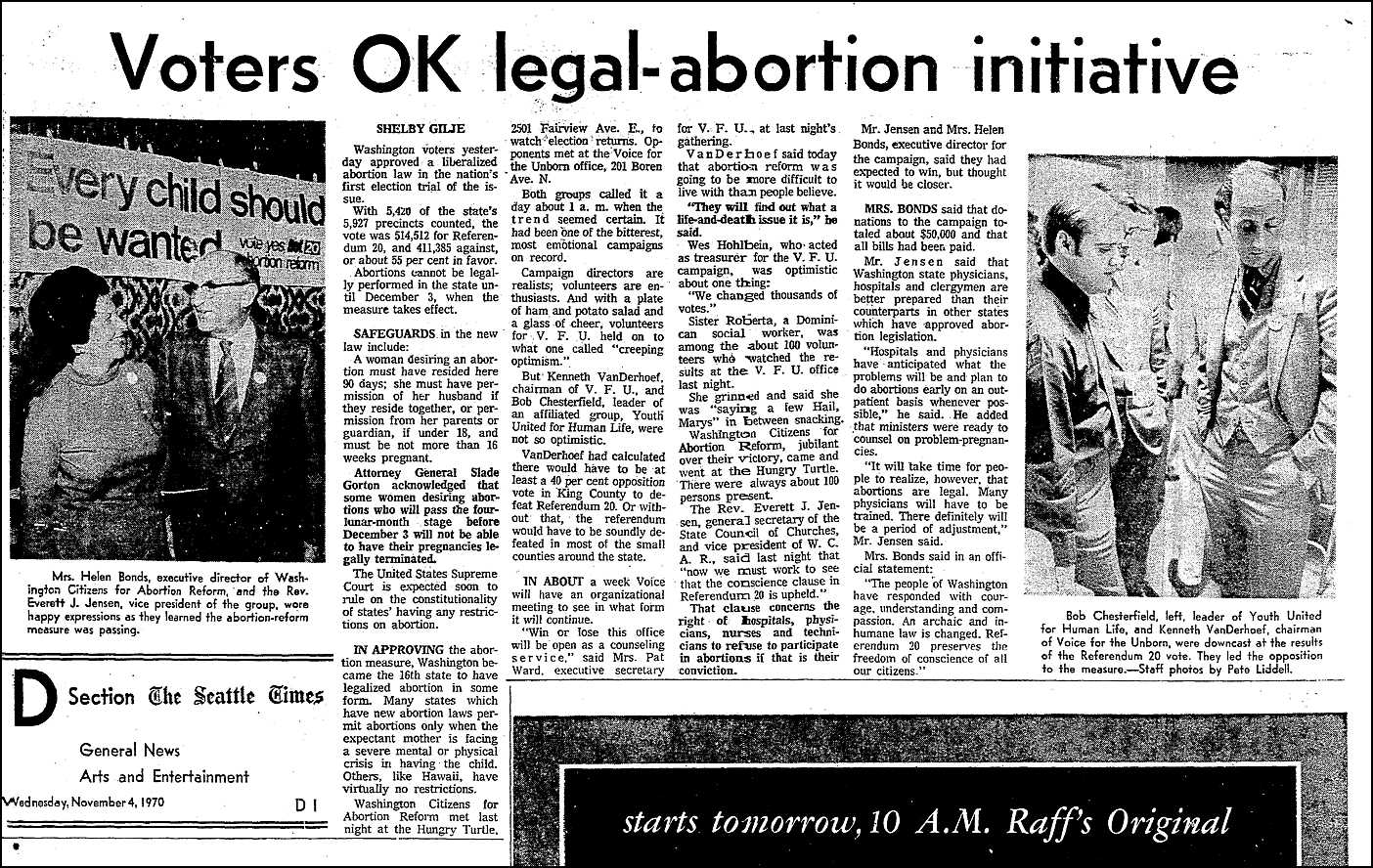
Washington legalized abortion in 1970, three years before the United States Supreme Court’s landmark Roe v. Wade ruling, following a bruising campaign in which opponents erected billboards showing a fetus with the slogan, “Kill Ref. 20, Not Me.”
The Evergreen State went on to strengthen a woman’s right to choose in 1991 and has since required that insurers offer contraceptives as part of their health plans.
The religious right is on a half-century losing streak here, coming up short in both abortion votes, watching voters approve domestic partnerships (2009) and then marriage equality (2012), and in 2020 ratify a supposedly controversial comprehensive sex education mandate for the state’s public schools.
Why here, and what lessons does experience here hold for other states in which abortion restrictions and bans are gaining traction in Republican-run Legislatures?
We had circumstances and a political culture not replicated today. A contingent of reasonable Republicans in the Washington State Senate – Joel Pritchard, Charlie Elicker, Fran Holman – championed legalization. Governor Dan Evans and Attorney General Slade Gorton, both later bound for the U.S. Senate, were pro-choice.
Pro-choice Republicans are today a species even more endangered than the spotted owl. The two parties have polarized. Senator Joe Manchin (D‑West Virginia) and Louisiana Governor John Bel Edwards are about the only two outspoken anti-abortion Democrats in upper ranks of the party.
A once-sizeable right-to-life caucus among House Democrats has vanished.
In years gone by, contraception was a cause with Republican champions.
A Houston congressman in the late 1960s championed contraception with such intensity that colleagues nicknamed him “Rubbers.”
His name was Representative George H.W. Bush.
But an anti-abortion plank has been included in the Republicans’ platform for more than forty years.
Lessons of long-ago decisions in this state remain salient after half-a-century. The pro-choice, pro-freedom movement, focused on gender rights, could benefit from redefining its appeal.
Abortion bans kill. The 1970 legalization vote was preceded by deaths of two women from botched abortions. People were moved, not by the threat, but by the reality. A memorable confrontation took place at mass in Seattle’s Assumption parish. A priest visiting for a mission program began a fiery sermon about abortion as “murder.” A young congregant asked whether a desperate young woman, seeking a back-alley abortionist, was risking her own life.
The priest refused to respect or respond to the question.
Privacy is a guiding value in Washington, curiously underplayed by progressives nationally. Perhaps it is our immigrant tradition, the Northwest being a place to escape from rules and rigid traditions applied elsewhere in the country.
It was an issue central to the legalization vote. A prominent Lutheran parson, speaking for Referendum 20, argued that the state had no role in deciding whether to bring a pregnancy to term. The decision belonged to a woman with involvement of their partner, family, physician and minister.
Surprisingly, I have seen few if any state campaigns run on a theme of privacy. The religious right seems to assume a right to dictate and discriminate. Where is the challenge? In Texas, counseling and aiding private decisions – even driving persons to a clinic — has been designated grounds for snitches to bring lawsuits.
Social justice was a major factor here, too.
Well-off Washington women were able to fly to Japan for abortions. Future U.S. Representative Jolene Unsoeld, D‑Washington, was one of those women and wrote about it in a 2018 memoir. (Unsoeld had a very conservative father, but recognized it was her decision to make and supported her.)
A clinic in a venerable building on Fourth Avenue in downtown Seattle offered the procedure, again discreetly to those who were well-connected.
The poor had no such recourse, until a Renton physician, Dr. A. Frans Koome, announced in public that he was performing abortions.
Dr. Koome had cojones. He brought down an avalanche of publicity but put a spotlight on the economics and hypocrisy surrounding abortion in Washington.
Hence, legalizing choice became an issue for reasonable folk to embrace, in removing the peril of back-alley abortions, respecting privacy in a very personal decision, and making a medical procedure available to all and not just the wealthy and well-connected.
The public also recoiled at the right-to-lifers’ stridency.
A Catholics-for-Choice movement sprung up in the state. A famous prank took place as election day neared. A “Kill Ref. 20 Not Me Billboard” stood prominently in Seattle’s University District. A person (or persons) unknown climbed up and painted a message beneath the fetus: “Happy Mother’s Day.”
Democratic elected officials are already focusing on reproductive rights as a 2022 election issue. They’re freshening their email lists for fundraising appeals.
An appeal from King County Executive Dow Constantine just arrived along these lines: “Will you add your name to our petition in support of reproductive freedom? Thank you for standing with us – It’s never mattered more.”
A donate button followed.
My recommendation: Do a little message retooling. What resonated with voters in this state a half-century ago is a blueprint for bolstering and protecting the right of choice from Washington to Washington, and even regressive places in between.

